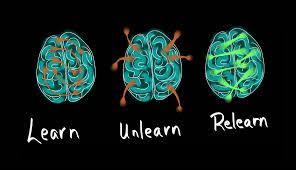Everyone with a healthy brain is influenced by their
environment. Everything in your
environment that you see, hear and touch is recorded in your brain. Those recordings become part of your
memory and shape what you think, say and do. Therefore, it’s imperative to expose your brain to that
which makes you smarter and more effective. Except, in the human paradigm, you unknowingly
inherit
habits that can sabotage the best planned efforts. In a previous article, I wrote about addictive behaviors that have been passed down for eons from one generation to the next. In this article, I would like to
discuss how to rid yourself of those self-inflicting habits.
Like all habits, they are believed to be hard to get rid
of. You have been indoctrinated
with the idea that change or transformation is difficult. Yet, every cell in your body is
replaced in seven-year cycles.
That in itself implies human beings were designed for
transformation. Nevertheless, you
inherited the belief that change is HARD.
Because so many say it, you believe it’s a fact of life. That is analogous to believing the
earth is the center of the universe.
At one time, the most educated scientists believed the earth was the
center. Copernicus questioned that
and made new discoveries.
While it seems odd to be addicted to a mindset, it appears
to be so. If you ask a person to
stop believing something, they will most likely debate and defend to prove their belief is
correct. That is what happened to
Copernicus when he told scientists that the sun was the center of the universe,
not the earth.
An example of how this is done in every day life is the
following: if your parents have always told you that life is difficult, there
is a good chance you are stuck with that thought. Furthermore, you would have most likely gone out of your way
to prove that that philosophy is correct.
If you encountered a situation that was easy, you would say it was just
luck. If someone told you to stop
believing life is difficult, you would rather trust your parents. And you would be as addicted to that
thought as an alcoholic is to vodka.
Like the alcoholic, you would have to confront you are
addicted to a belief that you
can’t stop believing, even when you want to. Also like the alcoholic, you would have to confront that you
have made life difficult when it wasn’t.
More importantly, you will have to distinguish every time you say to
yourself that something will be difficult, hard, impossible, someone will not
let you, etc. When you distinguish
those conversations that have been stored in your brain, you will realize that
the voices are not yours. They
belong to your parents, siblings, friends, movies, etc.
Once you distinguish those voices, you have a choice. You can continue to follow them. Or you can choose a new conversation
that you will create. This time it
will be one you crafted, instead of an inherited belief stored in your
brain.
Those outdated beliefs can be like mines in a minefield. Every time you hear those beliefs, they
can sabotage your personal or professional life. Once you have the distinction called “inherited beliefs”,
you will begin to see you have a plethora of beliefs you are addicted to. What’s worse, no one ever asked you if
you wanted those conversations stored in your brain. They simply imposed them on you.
Distinguishing imposed beliefs empowers you to unlearn
them. As you unlearn them, you
also have the power to pass on the unlearning knowledge to the next generation. That way they are not stuck with
self-sabotage beliefs that damage some of the best careers or marriages. They will have the freedom to choose
and store conversations in their brain that allow for an empowering and
fulfilling life.
What do you
think? I would love to hear your feedback. And I’m open to ideas. Or if you
want to write me about a specific topic, let me know.



Unfortunately when we face a hard situation we tend to be more willing to change...sometimes you need of the hard times to change a bad behavior.
ReplyDeleteDo you value self hypnosis for improving pathways, in general?
ReplyDelete